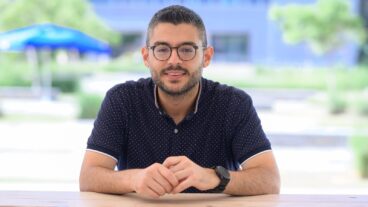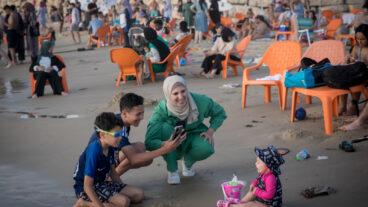Inbal Gur-Arie – ‘I understood that that was my purpose of my life – that there was some meaning in why I had been infected with AIDS. I realized that I had a gift that could save others.’For the first time an Israeli has been appointed by the United Nations body responsible for the World AIDS Campaign as an official ‘World AIDS campaigner.’
Thirty-year-old Inbal Gur-Arie, a well-known Israeli HIV/AIDS activist, was infected heterosexually by HIV (the virus that causes AIDS) 11 years ago. She will be one of eight AIDS campaigners internationally, only two of whom are women.
Worldwide there are 42 million HIV carriers – 35 million in Africa alone. The Middle East has one of the lowest rates of HIV infection, though numbers are rising.
As well as fighting her own disease, Gur-Arie is a volunteer with The Jerusalem AIDS Project (JAIP), a community-based organization focusing on education for HIV/AIDS prevention. JAIP is a member of IsraAID, a coordinating body of Israeli and Jewish organizations based in Israel active in development and relief work. Though Israel has a small population, the educational model developed by JAIP has been employed around the world for 15 years, and adopted by the UN.
JAIP’s training program in Israel has been implemented nationwide since 1987. Volunteers conduct 4-6 hour workshops in Israeli schools, usually with mixed classes of 15-16-year-olds. “I explain what the immune system is, what AIDS does and how you prevent it,” says Hanni Rosenberg, a qualified nurse and chair of JAIP. “I give the students condoms; show them how to put them on by using cucumbers. I even tell them how to buy condoms in the pharmacy. The kids giggle, of course, but we do this with humor and it works,” explains Rosenberg, who coordinates the activities of the 150 JAIP volunteers, many of whom are doctors.
At the end of the high school workshops Inbal Gur-Arie comes to the classroom to relate her own story. It is always a riveting moment for the participants. “When I speak to groups I tell them everything – from the moment I was hospitalized till today. I was infected at the age of 19 from someone from Africa. The kids can ask me anything they want,” says Gur-Arie.
Her case was publicized 11 years ago, when a member of the hospital staff treating her stole her medical file and leaked its contents to the media. Articles about her appeared in the local press. “I was an unusual case,” she relates today. “I was one of the few people in the world in whom the symptoms of the disease manifested themselves very quickly after I was infected. I was not only an HIV carrier; I was actually ill, and in a very serious condition. At first they didn’t know what it was.”
Traumatized, not only by the disease, but also by the fact that everyone knew she had AIDS, Gur-Arie refused to leave home for two years, until her mother finally insisted she go out to look for work. When she applied for a job in television she was ‘re-discovered’. She was identified as the same young woman that had been written about in the press, and another rash of TV and newspaper interviews followed.
It was then she got a call from Jerusalem AIDs project founder Inon Schenker, who asked if she would help in their educational programs. “I agreed and quite suddenly found myself speaking about my life to kids in schools,” she recalls. “I understood that that was my purpose of my life – that there was some meaning in why I had been infected with AIDS. I realized that I had a gift that could save others.”
JAIP is a formal NGO recognized by the UN as part of the UNAIDs organization. Its members go around the world demonstrating the unique education project. “There is a different dynamic, depending on how many hours we are given, and the culture of the host country,” explains Rosenberg. “Everywhere there is a different approach, but they can use this model.”
Last summer JAIP volunteers gave a five-week workshop in Yugoslavia for a world conference on AIDS. Most of the participants were from the Third World. “When we go around the world to give workshops, the people who attend return to their own countries and teach the methods there. They modify our model for their own needs,” says Hanni, Rosenberg, who has been involved in the project from the beginning.
The host communities pay for the kits, their shipment and the Israeli volunteers’ travel expenses. The illustrative drawings in the materials are often in the form of cartoons.
“So people smile when they see them,” says Rosenberg, who adds that JAIP volunteers have to adapt their methods to the specific community. “You can’t bring slides to a place where there is no electricity,” she points out. “In Nepal, for example, we sat in a circle on the ground with large placards and flip charts. We did the same in the Amazon in Brazil. You cannot be patronizing, but you must do what the community needs.”
Inevitably, the word ‘Jerusalem’ elicits reactions when the JAIP puts up its posters in workshops they give around the world. “For everyone, this is a special name,” Relates Rosenberg. “People see ‘Jerusalem’ and they come to ask us questions, not always about AIDS.”
According to the latest figures there are 3854 carriers in Israel. “Some people can be dismissive about this number, but if you remove the Muslim community and Haredi (ultra-Orthodox) communities, that have almost no cases, the percentage is significant,” states Rosenberg.
Beginning in 1995, with a breakthrough event held at the Tantur Ecumenical Institute near Jerusalem, The Jerusalem AIDS Project ran seven regional training courses that included Palestinian, Jordanian, Egyptian and Moroccan participants. The results, maintains Rosenberg, were impressive, and forged critical relationships. But since the renewed intifada in 2000, all links have been cut. “This is a shame. We have so many friends in the West Bank and Gaza, and there is absolutely no contact with them.”
In her new role as a UN AIDS good-will ambassador, Gur-Arie is determined to once again bring Israelis and Arabs together to fight AIDS. HIV knows no borders, she states.
Gur-Arie’s personal battle against the disease has reached a new impasse. Although Israeli HMOs pay for the necessary drug ‘cocktail’ to treat AIDS, in some cases the cocktail eventually loses its effectiveness. Gur-Arie now has to rely on supplies of a new treatment produced in the U.S., which her HMO refuses to fund.
“She might die any day if she doesn’t get this drug,” warns Hanni Rosenberg. “We have written to everyone, but no one will help.”












